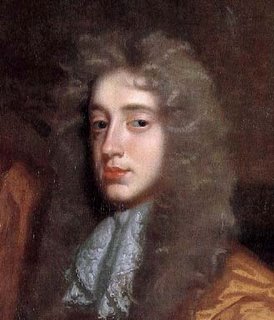 Samuel Johnson, on John Wilmot, 2nd Earl of Rochester (1647-1680, lately portrayed by Johnny Depp in The Libertine): “in a course of drunken gaiety, and gross sensuality, with intervals of study perhaps yet more criminal, with an avowed contempt of all decency and order, a total disregard to every moral, and a resolute denial of every religious obligation, he lived worthless and useless, and blazed out his youth and health in lavish voluptuousness; till, at the age of one and thirty, he had exhaustered the fund of life, and reduced himself to a state of weakness and decay.” His best poem, according to Johnson, is “Upon Nothing” (1678):
Samuel Johnson, on John Wilmot, 2nd Earl of Rochester (1647-1680, lately portrayed by Johnny Depp in The Libertine): “in a course of drunken gaiety, and gross sensuality, with intervals of study perhaps yet more criminal, with an avowed contempt of all decency and order, a total disregard to every moral, and a resolute denial of every religious obligation, he lived worthless and useless, and blazed out his youth and health in lavish voluptuousness; till, at the age of one and thirty, he had exhaustered the fund of life, and reduced himself to a state of weakness and decay.” His best poem, according to Johnson, is “Upon Nothing” (1678):Nothing, thou elder brother even to Shade,
Thou hadst a being ere the world was made,
And (well fixed) art alone of ending not afraid.
Ere time and place were, Time and Place were not,
When primitive Nothing, Something straight begot;
Then all proceeded from the great united what.
Something, the general attribute of all,
Severed from thee, its sole original,
Into thy boundless self must undistinguished fall.
Yet Something did thy mighty power command
And from thy fruitful Emptiness’s hand
Snatched men, beasts, birds, fire water, air, and land.
Matter, the wicked’st offspring of thy race,
By Form assisted, flew from thy embrace,
And rebel Light obscured they reverend dusky face.
With Form and Matter, Time and Place did join;
Body, thy foe, with them did leagues combine
To spoil thy peaceful reign and ruin all thy line.
But turncoat Time assists the foe in vain
And bribed by thee destroys their short-lived reign
And to thy hungry womb drives back the slaves again.
Thy mysteries are hid from laic eyes,
And the divine alone by warrant pries
Into thy bosom, where the truth in private lies.
Yet this of thee the wise may truly say,
Thou from the virtuous nothing tak’st away,
And to be part of thee the wicked wisely pray.
Great Negative, how vainly would the wise
Inquire, define, distinguish, teach, devise
Didst thou not stand to point their dull philosophies.
Is or Is Not, the two great ends of Fate,
And True and False, the subject of debate
That perfects or destroys the vast designs of state,
When they have racked the politician’s breast,
Within they bosom must securely rest
And when reduced to thee are least unsafe and best.
But Nothing, why does Something still permit
That sacred monarchs should at council sit
With persons thought, at best, for nothing fit,
While weighty Something modestly abstains
From princes’ affairs and from statesmen’s brains;
And nothing there like stately Nothing reigns.
Nothing, that dwell with fools in grave disguise,
For whom they reverend forms and shapes devise,
Lawn sleeves, and furs, and gowns, when they like thee look wise.
French truth, Dutch prowess, British policy,
Hibernian learning, Scotch civility,
Spaniards’ dispatch, Danes’ wit are mainly seen in thee.
The great man’s gratitude to his best friend,
Kings’ promises, whores’ vows, to thee they bend,
Flow swiftly to thee and in thee ever end.
No comments:
Post a Comment